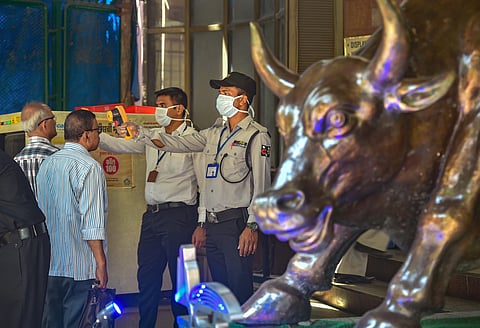

HYDERABAD: It's a bit of a stretch, but the global economy is witnessing its own Final Destination moment.
Much like the movie reminding us about the inescapability of death, economic cycles dictate that growth expansion follows contraction and vice versa. It's a pattern and we are powerless to change it.
Despite sincere efforts, no country is slowdown or recession-proof yet. Like death, downturns are a fact of life. We can possibly deter them, but cannot extinguish forever. And the looming 2020 global economic crisis, compounded by the Covid-19 pandemic, only reaffirms that belief.
Throughout 2019, nations held their breath amid chilling recessionary warnings intensified by the US-China trade war. We've barely thwarted that eventuality only to be caught off-guard by Covid-19, which perched economies onto a synchronized growth crash, without mercy.
The trauma from the 2008-09 global financial crisis is still fresh, but here comes another brutal truth: Global GDP will be back in the red. Both Morgan Stanley and Goldman Sachs found an unsettling fact that we are coursing through a recession right now and that the world economy will shrink in the first two quarters of 2020, but may rebound in the last two quarters.
Just two quarters of contraction, but the effects could be debilitating than the 2001 and 2008 crisis. That's because growth was already fragile largely due to domestic troubles. If the flaws of finance (bad loans and NBFC crisis) rolled into a demand-side issue in India dragging growth, Hong Kong saw violent protests opposing an extradition treaty with mainland China, hitting the financial hub's output hard. Then we have Britain and its endless Brexit struggle, while Italy's economy waged a battle with Brussels. The list is endless.
In other words, economies are vulnerable to the slightest of the hiccups, and that's when Covid-19 jammed the dagger in the back paralyzing human lives and global trade.
Several countries are in lockdown with travel, tourism, hospitality and services sector getting whiplashed. On Wednesday, the UN delivered some more bad news - 25 million will be out of work translating to $3.4 trillion in lost income this year. These are only initial estimates.
The economic consequences will be felt for long.
Take Iceland. The country gets half its export revenue from tourism and is staring at lost business for two quarters at least.
Similarly, Chile, for which copper exports translate to crucial revenue, is hung out to dry until borders are unlocked.
US airlines are seeking a $50-billion relief -- the industry's largest-ever bailout -- while CAPA hinted that Indian airlines will run out of the road in the absence of government relief.
The first and the hardest hit will be financial entities. The Bank of International Settlements believes over 12 per cent borrowers can't cover their interest payments, stoking fresh trouble to banks.
If the pandemic prolongs, defaults among the China's $36 trillion public debt aren't ruled out, potentially triggering another financial crisis as China houses the world's four largest banks. If the Asian giant's GDP contracts in the first quarter, it'll be a first since 1976. But if it contracts one more quarter, it's as good as tripping on a colossal landmine as the world economy is over-dependent on China than ever. If in 2003, it accounted for 4 per cent of global GDP, that figure stands at 17 per cent today.
Put simply, countries are at war with the virus. And they are attacking with both monetary and fiscal bullets.
Because there's limited role and room for interest rate cuts, central banks are reactivating crisis-era quantitative easing tools. The US Fed announced $1.5 trillion credit boost including printing more money, encouraging dollar swaps, and supporting the issue of commercial paper, which companies borrow to meet everyday expenses like rent and salaries. These are simply not enough, which is why fiscal stimulus is finding its way and no amount seems extravagant at this juncture.
First up is the 19-member Euro zone inching towards a dreadful sovereign debt crisis. Despite a common currency and monetary policy, the regions' fiscal issues are diverse and now is a crucial time. So, it decided to spend 1 per cent of GDP to fight Covid-19, besides announcing public guarantee schemes and deferring tax payments worth 10 per cent of GDP.
Separately, the US government is considering handing over $1,000 cheques to citizens, loosely called 'helicopter money', to keep people in their homes despite fears of going out of work. At over $1.25 trillion, the aid proposed is higher than the $850-billion released during the American recovery and reinvestment Act of 2009.
Similarly, France suspended payment of taxes, rent and utility bills for companies, while Italy offered tax credits to firms suffering a 25 per cent drop in turnover.
Singapore is planning tax breaks for corporates and rental and tax rebates for commercial properties, while Korea is handing out cheques to small firms struggling to pay wages.
Our own RBI announced dollar-INR swaps and long-term repo rate operations, but without aggressive measures and rate cuts, they will be a puff of smoke. The government, though on a war-footing, lacks in its act of fiscal kindness for companies and citizens.
If volatility during the 2008-09 crisis lasted just about five months as policymakers contained it pumping money, now, we simply don't know what we are up against and how long it'll last.
While governments are at it, for economies and everyone else can draw hope from the soon-to-be-released James Bond movie title -- No Time to Die.